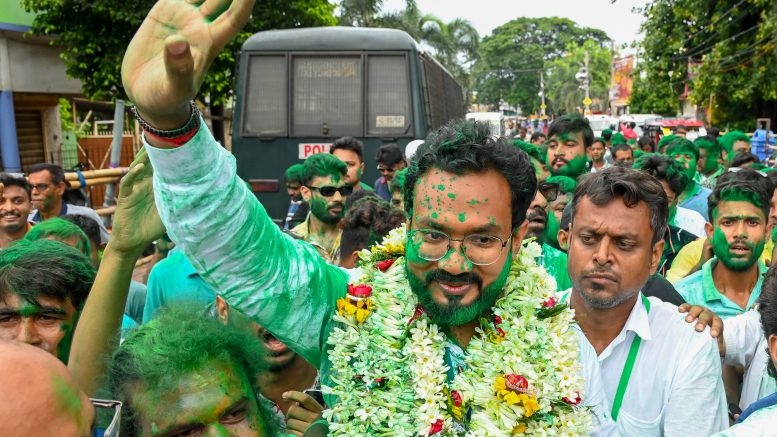Ranaghat, July 10: Bharatiya Janata Party (BJP) paid a heavy price for its complacency and lack of strategic acumen in the assembly bye-elections held on July 10. The party lost two prominent Matua-dominated segments: Ranaghat South and Bagda.
In the 2021 assembly polls, the saffron party had triumphed over the Trinamool Congress in both seats. Additionally, it secured a substantial lead in the Lok Sabha elections held more recently (with 36,936 votes in Ranaghat and 20,614 votes in Bagda). However, the ruling Trinamool Congress staged a remarkable comeback, significantly reducing the BJP’s strength in the state legislature.
In Nadia’s Ranaghat South, Trinamool Congress candidate Mukutmani Adhikari defeated BJP’s Manoj Biswas by a margin of 39,048 votes. Meanwhile, in North 24 Parganas’ Bagda, Trinamool Congress candidate Madhuparna Thakur emerged victorious, defeating BJP’s Binoy Kumar Biswas by 33,455 votes. Madhuparna, the daughter of Trinamool’s Rajya Sabha MP Mamatabala Thakur and cousin of BJP MP and central minister Shantanu Thakur, now holds the distinction of being the youngest MLA.
The sudden turnaround in results, occurring just a month after the Lok Sabha polls, caught the BJP off guard. The party labeled the outcome a “farce” and claimed it did not reflect the people’s true mandate, alleging instances of voter suppression and coercion.
While the local Trinamool leadership celebrated the victory as a sign of Matua support returning to their fold (after shifting toward the BJP since 2019), the state Trinamool leadership pragmatically attributed the win to the BJP’s absence on the ground during campaigning.
Trinamool’s winning candidate, Mukutmani Adhikari, pointed out that many of the BJP’s party workers are Matuas who had become disillusioned with the party’s ideals and policies.
The discontent among BJP workers in both Ranaghat South and Bagda stemmed from the nomination of outsiders as candidates. This led to a considerable portion of the party becoming inactive, which became evident on Election Day when they failed to counter Trinamool’s strategic moves effectively.
In both constituencies, trusted leaders like Mahua Moitra (in Ranaghat) and Partha Bhowmik-Rathin Ghosh (in Bagda), handpicked by Mamata Banerjee, played a crucial role in controlling and monitoring the election campaign. Some local leaders even issued warnings, emphasizing the need for sincere efforts to secure victory.
Trinamool capitalized on the BJP’s internal strife by mobilizing party workers from outside, ultimately outnumbering the complacent saffron party during the July 10 bye-elections.
Despite the setback, the BJP remains hopeful, eyeing the 2026 assembly elections as the real test to assess its position among the Matuas. However, introspection is necessary, especially regarding the choice of local candidates and ground-level realities.
“Since 2016 we have been urging for a local candidate. But our complacent leaders never realized the ground realities, rather exploited Matuas’ support. The party did not try to learn from defeats in Lok Sabha election which was more due to poor selection of candidates ignoring the ground realities”, a BJP leader and Bagda said, accusing the leadership of never trying to “build up own dedicated force” for its wrong policy decision.
Bengal BJP’s spokesperson Shamik Bhattacharjee also echoed the point raised by Bagda leader, while speaking to reporters in Calcutta. “We don’t have the vote-based organizational strength and capabilities which ideally require to fight the election”, he said.
He also said that the party failed to protect the voters. “We apprehended a defeat but not in this way. Our traditional vote bank was attacked and we failed to protect voters too. We could not so far develop our organizational strength in Bengal which is required to resist such attack. The way the vote was looted only ensured the tradition of the ruling party’s victory in the bye-election”, Bhattacharjee added.

